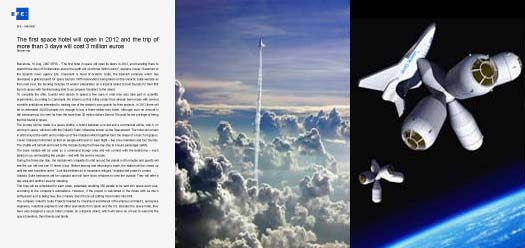
Agency
EFE
GALACTIC SUITE
(Spain)
THE FIRST HOTEL IN SPACE WILL OPEN ITS DOORS IN 2012 AND TRAVELLING THERE WILL COST THREE MILLION EUROS
“The first hotel in space will open its doors in 2012, and travelling there to spend three days 450 kilometres above the earth will cost three million euros”, explains Xavier Claramunt to the Spanish news agency Efe. Claramunt is head of Galactic Suite, the Spanish company which has developed a global project for space tourism. With reservations being taken on the Galactic Suite website as from next year, the booking includes 18 weeks’ preparation on a tropical island to train tourists for their first trip into space with families being able to accompany travellers to the island.
To complete the offer, tourists who decide to spend a few days in orbit may also take part in scientific experiments, according to Claramunt. He informs us that initial contact has already been made with several scientific institutions interested in making use of the station’s zero gravity for their projects. In 2012 there will be an estimated 40,000 people rich enough to buy a three-million-euro ticket. Although such an amount is still astronomical, it is very far from the more than 20 million dollars Dennis Tito paid for the privilege of being the first tourist in space.
The journey will be made in a space shuttle, a hybrid between a rocket and a commercial airline, which, on arriving in space, will dock with the Galactic Suite, otherwise known as the Spaceresort. The hotel will remain in orbit around the earth and is made up of five modules which together form the shape of a bunch of grapes.
Xavier Claramunt informed us that six people will travel on each flight – two crew members and four tourists. The shuttle will remain anchored to the module during the three-day stay to ensure passenger safety.
The base module will be used as a communal lounge area and will connect with the bedrooms – each bedroom accommodating two people – and with the service module.
During the three-day stay, the module will complete its orbit around the planet in 80 minutes and guests will see the sun set and rise 15 times a day. Before leaving and returning to earth, the station will be closed up until the next travellers arrive. “Just like trekkers do in mountains refuges,” explains the project’s creator.
Galactic Suite bedrooms will be capsular and will have show windows to view the outside. They will offer a day area and another area for sleeping.
Two trips will be scheduled for each week, potentially enabling 350 people to be sent into space each year, according to the company’s estimations. However, if the project is welcomed in the future with as much enthusiasm as it is being now, the company doesn’t rule out putting more hotels into orbit.
The company Galactic Suite Proyects headed by Claramunt and Marsal Gifra employs architects, aerospace engineers, industrial engineers and other specialists from Spain and the US. Besides the space hotel, they have also designed a luxury hotel complex on a tropical island, which will serve as a base to welcome the space travellers, their friends and family.
An aerospace museum open to the public will also built in another area on the island. A space-themed leisure area will enable visitors to watch the shuttles being launched from a near-by island, next to a third island where the training centre, medical services and technical control of the facilities will be located.
The overall cost for the whole project will be around two million euros and includes purchase of the islands and the space craft as well as the construction of the space port facilities and the space hotel.
There are currently private investors from the Arab Emirates and Japan interested in financing the project. However, Equipo Claramunt would love Spanish capital to be involved as well, since they believe there is enough potential investment capital and technical know-how for the country to place itself at the forefront in the conquest of space tourism.
Claramunt’s team also said that, although only the richest and most influential people in the world will be able to fly into space during the initial stages of the project, they hope they will become aware of “the importance of looking after the earth and on returning and they will feel the need to ensure a better planet and a more sustainable world.”
